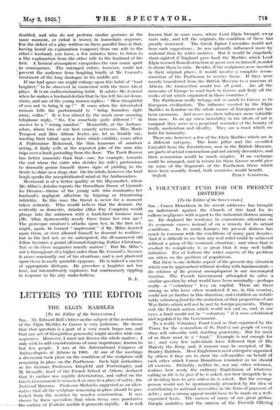LETTERS TO THE EDITOR
THE ELGIN MARBLES
[To the Editor of the SPECTATOR.]
'SIR,— Mr. Edward Bell's letter on the subject of the restoration 'of the" Elgin Marbles to Greece is very judicious. He shows that that question is a part of a very much larger one, and 'that any act of thoughtless generosity might involve wide con- sequences. However, I must not discuss the whole matter ; I only wish to add considerations of some importance, known to but few people. I was at the International Congress of Archaeologists at Athens in 1905. At one of the meetings a discussion took place on the condition of the sculpture still remaining in place on the Parthenon. Such high authorities as the German Professors Diirpfeld and Furtwangler, and M. Homolle, head of the French School at Athens, declared that its surface was rapidly deteriorating, and called on the Greek Government to remove it at once to a place of safety, the National Museum. Professor Michaelis suggested as an alter- native that all the sculpture remaining in place should be pro- tected from the weather by wooden construction. It was shown by these specialists that when decay once penetrates -the-aarfaae-of Pentelic marble it proceeds.rapidly. -It is well
known that in some cases, where Lord Elgin brought away casts only, and left the originals, the condition of these has greatly worsened. The Greek Ephor Caovadias would not hear such suggestions ; he was naturally influenced more by national than by wider motives. But it would be singularly short-sighted if England gave back the Marbles which Lord Elgin rescued from destruction at great cost to himself, in order to doom them to ruin. Besides, if the sculptures were inserted in their original place it would involve a complete recon- struction of the Parthenon to receive them. If they were merely transferred from the British Museum to a museum at Athens, the transaction would lose all point. Are all the museums of Europe to send back to Greece and Italy all the works of art which originated in those countries ?
The Parthenon really belongs not so much to Greece as to European civilization. The influence exerted by the Elgin Marbles in London on the whole course of European art has been enormous. And never was their influence more valuable than now. In an age when instability in the ideals of art is rampant they serve as a perpetual reminder of the beauty of truth, moderation and ideality. They are a trust which we hold for humanity.
There are, however, a few of the Elgin Marbles which are in a different category. The Ionic pillar and the so-called Caryatid from the Erechtheum, now in the British Museum, are parts of actual construction and not merely decorative, and their restoration would be much simpler. If an exchange could be arranged, and in return for them Greece would give up some of the fragments of the Parthenon frieze which have been recently found, both countries would benefit.










































 Previous page
Previous page